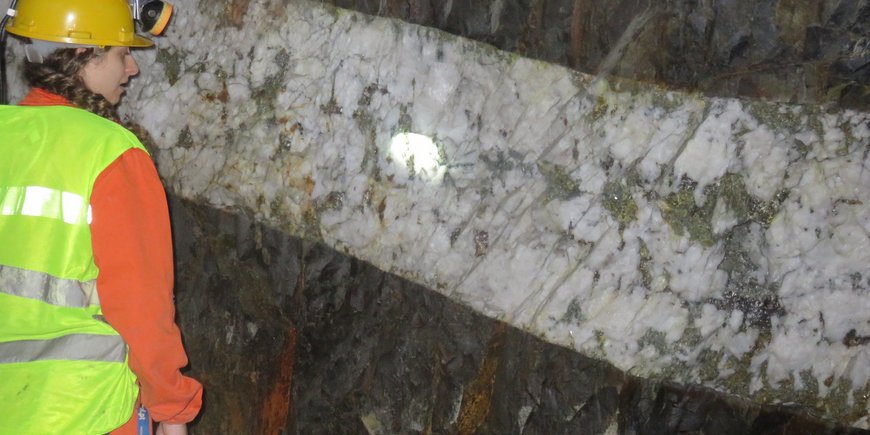How and where are metals enriched to form ore? And how can we find enough of them to meet the growing demands of technically-advanced societies? These questions are the focus of the new DFG-funded Priority Program called "Dynamics of Ore Metals Enrichment" (DOME), which was initiated by a team of scientists from German universities (University of Potsdam, University of Freiburg and University of Münster) and the GFZ section Inorganic and Isotope Geochemistry (Sarah Gleeson, Robert Trumbull, Philipp Weis).
The formation of economic ore deposits typically requires a 1000-fold enrichment of metals into concentrated ore bodies. The DOME program aims to understand the fundamental processes involved so as to develop more efficient and sustainable ways to ensure metals supply in the future. Substitution and recycling play increasing roles in the “resource mix” but the near future will see growing demand for primary resources of many metals, particularly to support technologies needed for the energy transition.
Established in June, 2020 with a budget of 6.5 million Euros, the first 3-year phase of DOME involves 24 projects partnered by 16 German universities and research institutions including the Helmholtz centers GFZ, KIT and GEOMAR. The projects combine case studies of ore formation in the field, laboratory experiments to determine the physical and chemical controls of metal transport and precipitation, and thermal-mechanical modelling to translate these results into testable geologic models (see https://www.uni-potsdam.de/en/spp2238/).
DOME is coordinated at the University of Potsdam by Prof. Max Wilke. GFZ researchers from the Section of Inorganic and Isotope Geochemistry and the Section of Chemistry and Physics of Geomaterials are involved in 5 projects with a total budget of 851 thousand Euros.
The first ideas for ‘DOME’ were discussed at a meeting in Potsdam-Golm in 2016. “The subject of ore formation is perfect for a priority programme because so many factors and so much special knowledge must be combined”, explains Robert Trumbull. “Priority programmes are special because they build a community of researchers and students working together on one subject. And ‘DOME’ has the added appeal that what we plan to achieve will be of direct use for society”. Sarah Gleeson adds: “From my perspective as section head and topic speaker for Georesources in POF-IV, ‘DOME’ comes at just the right time to strengthen cooperation of the Helmholtz Centres with German universities. It will create opportunities for a new generation of students and young scientists and it will also go a long way towards making Germany more visible as a major player in ore-deposit research”.
(ks)








![[Translate to English:] Torsten Sachs in front of a climate station on a field](/fileadmin/_processed_/3/9/csm__TorstenSachs_bearbeitet_GS_4a1365ef84.jpeg)

![[Translate to English:] left image flood at the Ahrtal: image from above, several houses are flooded; left image:: Heidi Kreibich;](/fileadmin/_processed_/4/4/csm_Bild2_9af0130e9f.png)



![[Translate to English:] Start der Vega Rakete](/fileadmin/_processed_/6/4/csm_20231201-kachel_Vega-VV23-launch_ESA-CNES-Arianespace_706716b68c.jpeg)









![[Translate to English:] Poster exhibition at the Brandenburg Hydrogen Day at the GFZ, some participants in the foreground](/fileadmin/_processed_/6/5/csm_Erster_Brandenburgischer_Wasserstofftag_GFZ_402fcec95e.jpeg)
![[Translate to English:] Group picture of the participants](/fileadmin/_processed_/9/4/csm_20231108_CAWa-Workshop-Tashkent_Gruppenbild_99ea779d8a.jpeg)

![[Translate to English:] [Translate to English:] Hörsaal](/fileadmin/_processed_/e/6/csm_H%C3%B6rsal_e21ac645fb.jpeg)


![[Translate to English:] The Delegations in the Historic Library on the Telegrafenberg. In the back there are from left to right, the Dutch Ambassador for Germany, Ronald van Roeden, the Dutch Minister for Education, Culture and Science, Robbert Dijkgraaf and the scientific director of the GFZ, Susanne Buiter.](/fileadmin/_processed_/d/b/csm_Kachel-2_9eba4b4212.jpeg)

